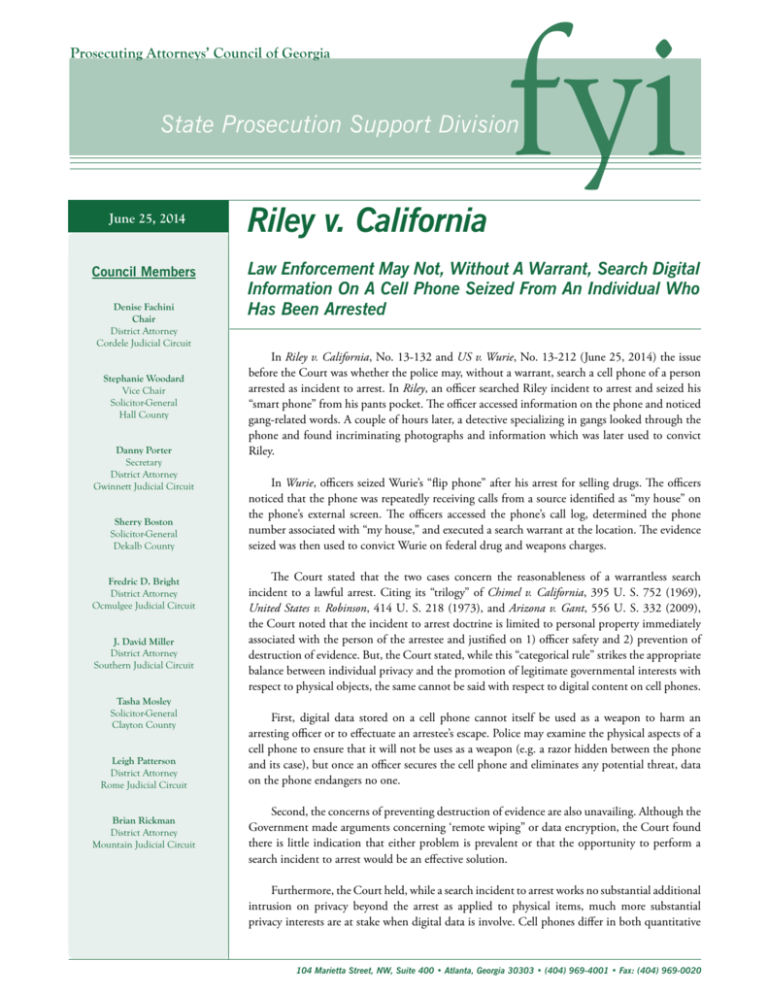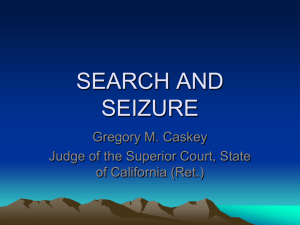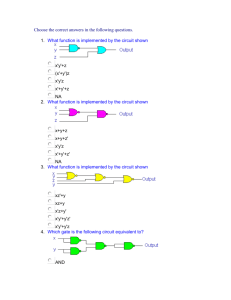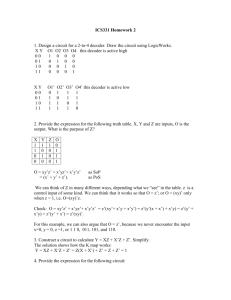Riley v. California - Prosecuting Attorneys' Council of Georgia
advertisement

fyi Prosecuting Attorneys’ Council of Georgia State Prosecution Support Division June 25, 2014 Council Members Denise Fachini Chair District Attorney Cordele Judicial Circuit Stephanie Woodard Vice Chair Solicitor-General Hall County Danny Porter Secretary District Attorney Gwinnett Judicial Circuit Sherry Boston Solicitor-General Dekalb County Fredric D. Bright District Attorney Ocmulgee Judicial Circuit J. David Miller District Attorney Southern Judicial Circuit Tasha Mosley Solicitor-General Clayton County Leigh Patterson District Attorney Rome Judicial Circuit Brian Rickman District Attorney Mountain Judicial Circuit Riley v. California Law Enforcement May Not, Without A Warrant, Search Digital Information On A Cell Phone Seized From An Individual Who Has Been Arrested In Riley v. California, No. 13-132 and US v. Wurie, No. 13-212 (June 25, 2014) the issue before the Court was whether the police may, without a warrant, search a cell phone of a person arrested as incident to arrest. In Riley, an officer searched Riley incident to arrest and seized his “smart phone” from his pants pocket. The officer accessed information on the phone and noticed gang-related words. A couple of hours later, a detective specializing in gangs looked through the phone and found incriminating photographs and information which was later used to convict Riley. In Wurie, officers seized Wurie’s “flip phone” after his arrest for selling drugs. The officers noticed that the phone was repeatedly receiving calls from a source identified as “my house” on the phone’s external screen. The officers accessed the phone’s call log, determined the phone number associated with “my house,” and executed a search warrant at the location. The evidence seized was then used to convict Wurie on federal drug and weapons charges. The Court stated that the two cases concern the reasonableness of a warrantless search incident to a lawful arrest. Citing its “trilogy” of Chimel v. California, 395 U. S. 752 (1969), United States v. Robinson, 414 U. S. 218 (1973), and Arizona v. Gant, 556 U. S. 332 (2009), the Court noted that the incident to arrest doctrine is limited to personal property immediately associated with the person of the arrestee and justified on 1) officer safety and 2) prevention of destruction of evidence. But, the Court stated, while this “categorical rule” strikes the appropriate balance between individual privacy and the promotion of legitimate governmental interests with respect to physical objects, the same cannot be said with respect to digital content on cell phones. First, digital data stored on a cell phone cannot itself be used as a weapon to harm an arresting officer or to effectuate an arrestee’s escape. Police may examine the physical aspects of a cell phone to ensure that it will not be uses as a weapon (e.g. a razor hidden between the phone and its case), but once an officer secures the cell phone and eliminates any potential threat, data on the phone endangers no one. Second, the concerns of preventing destruction of evidence are also unavailing. Although the Government made arguments concerning ‘remote wiping” or data encryption, the Court found there is little indication that either problem is prevalent or that the opportunity to perform a search incident to arrest would be an effective solution. Furthermore, the Court held, while a search incident to arrest works no substantial additional intrusion on privacy beyond the arrest as applied to physical items, much more substantial privacy interests are at stake when digital data is involve. Cell phones differ in both quantitative 104 Marietta Street, NW, Suite 400 • Atlanta, Georgia 30303 • (404) 969-4001 • Fax: (404) 969-0020 fyi Prosecuting Attorneys’ Council of Georgia State Prosecution Support Division June 25, 2014 Council Members Denise Fachini Chair District Attorney Cordele Judicial Circuit Stephanie Woodard Vice Chair Solicitor-General Hall County Danny Porter Secretary District Attorney Gwinnett Judicial Circuit Sherry Boston Solicitor-General Dekalb County Fredric D. Bright District Attorney Ocmulgee Judicial Circuit J. David Miller District Attorney Southern Judicial Circuit Tasha Mosley Solicitor-General Clayton County and qualitative sense from other objects that might be carried on an arrestee’s person. Before cell phones, a search of a person was limited by physical realities and generally constituted only a narrow intrusion on privacy. But modern cell phones have vast storage capacity and therefore can store millions of pages of text, thousands of pictures, or hundreds of videos. Moreover, data accessed on a cell phone may in fact be stored on a remote server and therefore, a search may extend beyond papers and effects in the physical proximity of an arrestee. The Court stated, “We cannot deny that our decision today will have an impact on the ability of law enforcement to combat crime.” But, “[p]rivacy comes at a cost.” All of the solutions suggested by the Government were found to be unworkable and not in keeping with the Court’s preference to “provide clear guidance to law enforcement through categorical rules.” Consequently, the Court concluded, “Our answer to the question of what police must do before searching a cell phone seized incident to an arrest is according simple – get a warrant.” Nevertheless, the Court did find that there may be circumstances in which exigent circumstances would justify the warrantless search of a cell phone. Such exigencies could include the need to prevent imminent destruction of evidence in individual cases, to pursue a fleeing suspect, or to assist persons who are seriously injured or are threatened by imminent injury. But, unlike the categorical search incident to arrest exception, the exigent circumstances exception requires a court to examine whether an emergency actually justified a warrantless search in each particular case. Although the Court did not address this issue, law enforcement should also still be able to obtain consent to search a cell phone. However, as with any issue involving consent, and particularly considering the fact that most cell phones are mini-computers, an officer should be very clear as to what specifically on the cell phone the officer is requesting the arrestee consent to be searched. See Walker v. State, 299 Ga.App. 788, 791 (2) (2009). Finally, the Supreme Court’s decision in Riley means that our state’s Supreme Court decision in Hawkins v. State, 290 Ga. 785 (2012) (a cell phone is roughly analogous to a container and may be searched without a warrant as incident to a lawful arrest) has effectively been overruled. Leigh Patterson District Attorney Rome Judicial Circuit Brian Rickman District Attorney Mountain Judicial Circuit 104 Marietta Street, NW, Suite 400 • Atlanta, Georgia 30303 • (404) 969-4001 • Fax: (404) 969-0020 2






